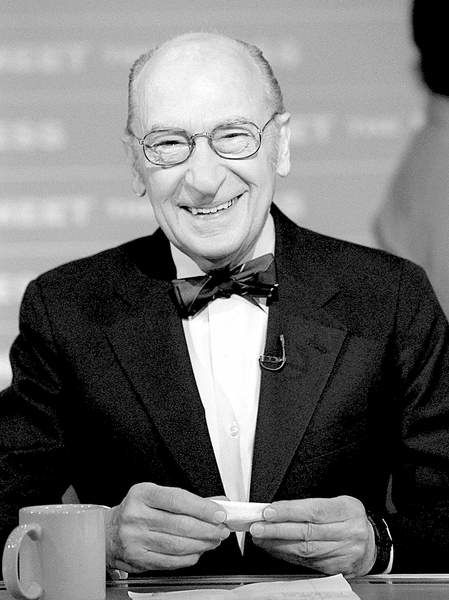Irving R. Levine, 86, longtime correspondent for NBC News
Published 5:00 am Saturday, March 28, 2009

- When Irving R. Levine was asked by producers to drop his middle initial to shave seconds off a newscast, he replied he would “rather drop the ‘B’ in NBC.”
WASHINGTON — Irving R. Levine, the balding, bow-tied correspondent for NBC News whose insistent use of his middle initial amused viewers even as he informed them of economic news and world affairs, died Friday at the Washington Home hospice of complications from prostate cancer. He was 86.
Levine reported for NBC for 45 years, starting as a Korean War correspondent and the first American television reporter based in the Soviet Union during the Cold War. In 1971, he became the first network correspondent assigned full-time to the economy. After leaving NBC in 1995, he delivered economic commentary on PBS’ “Nightly Business Report” until 2008.
Levine’s unabashedly old-fashioned delivery, his bow ties and his middle initial made him a distinctive personality amid the younger, blow-dried correspondents.
He owned 103 bow ties, and he had the longest-running signoff in television news. “Irving R. Levine, NBC News, Rome,” took a full six seconds, a producer once said, and Levine could turn the word Rome into three syllables.
One busy news day, as NBC Nightly News producers were struggling to shave seconds from the program, Levine was asked to drop his middle initial. “I’d rather drop the ‘B’ in NBC,” he replied.
In 1981, then-Vice President George H.W. Bush noted the “sex symbols” at the White House Correspondents’ Dinner: “Diane Sawyer, Jane Pauley, Leslie Stahl, Irving R. Levine. … Wherever Irving goes, female groupies beg for a lock of his bow tie.” Eight years later, actress Candice Bergen, in the role of a TV news anchor on the sitcom “Murphy Brown,” was said to have had “the hots for Irving R. Levine.”
Irving Raskin Levin was born Aug. 26, 1922, in Pawtucket, R.I. He graduated from Brown University and served in the Army Signal Corps during World War II, leading a news-photo group in Japan and the Philippines.
After the war ended, he received a master’s degree in journalism from Columbia University in 1947. He joined the old International News Service in New York and became a foreign correspondent by offering to pay his own fare to Europe.
In 1950, he was sent to cover the Korean War for INS. For extra cash, he signed up as a stringer with NBC radio, catching his big break during the Inchon landing when the network’s staff correspondents, all aboard U.S. Navy ships, were unable to cover the story because the Navy imposed radio silence.
After the war and a fellowship, he got a visa to the Soviet Union, which had been largely closed to outsiders since the 1953 death of Joseph Stalin. Levine accompanied a group of Iowa farmers on a 1955 tour of Siberia and then managed to persuade to the Soviets to allow him to stay on and open an NBC bureau in Moscow.
Transferred to Rome in 1959, he reported: “Advice to tourists: If you really want to enjoy your trip to Italy, spend four years in Russia first.”
In late 1970, he was transferred to Washington, where he became the labor economics correspondent. He had to fight for airtime until mid-1971, when President Richard M. Nixon imposed wage and price controls and took the United States off the gold standard. Suddenly, Levine’s crisp, dry, informative prose was in demand.
He wrote four books, including “Main Street, USSR” (1959), which made the best-seller lists.
Survivors include his wife of 52 years, Nancy J. Levine of Washington; three children, Jeffrey C.B. Levine and Daniel Rome Levine, both of Chicago, and Jennifer J. Levine of Chevy Chase, Md.; a sister; and three grandchildren, all of whom use their middle initials.






